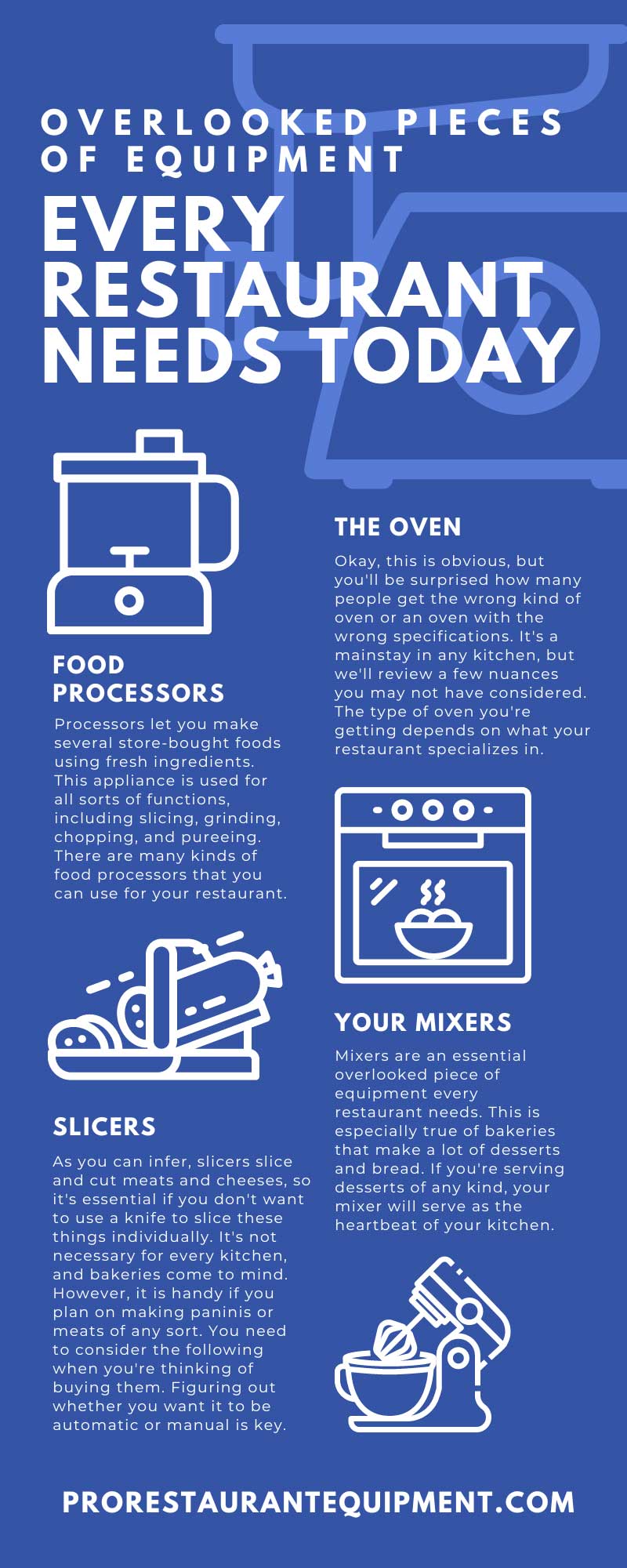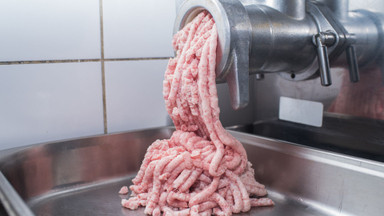Oct 4th 2022
Overlooked Pieces of Equipment Every Restaurant Needs Today
You know how difficult it is if you're starting your own business. There's so much to keep track of, and it's easy to lose count of all the balls you're juggling. This is true of any business, but this is especially true of the food industry.
If you're opening a new restaurant, the last thing you want is for your customer to ask for something you can't provide because you forgot an item that can help you cook it. If a customer wants cookies, assuming you want to be efficient, a mixer would be ideal. If you serve hamburgers, a professional meat grinder will do the job. If you don't have one, you can still make them, but it would be far less efficient—and in the restaurant industry, time is money.
To help you, we've written a list of the overlooked pieces of equipment every restaurant needs today. Read on to find out more.
The Oven
Okay, this is obvious, but you'll be surprised how many people get the wrong kind of oven or an oven with the wrong specifications. It's a mainstay in any kitchen, but we'll review a few nuances you may not have considered. The type of oven you're getting depends on what your restaurant specializes in.
The Size
Size is determined by the amount of space you have in your kitchen. It would be ideal to quickly sketch how much space you have after you've measured it. Remember to measure the door's dimensions to the room you fit your oven through. Otherwise, it won't be able to fit into the room. After that, sit down and craft your commercial kitchen layout, so you'll know how you want to configure everything. You should have a rough idea of how you want everything to fit in the room.
The Quality
Your oven range is the heartbeat of your establishment, so make sure where you get your oven is from a reputable company. Check reviews on Google and Yelp to determine what brands are ideal. You should search for companies with high reviews that have served the food industry for some time.
The Function
This will depend on the cooking your restaurant is planning. Decide what type of stove you want: gas or electric. After that, figure out which kind you'll require for your kitchen. A bakery will be different from a soul food restaurant, which will be different from a fine dining restaurant.
Food Processors
Processors let you make several store-bought foods using fresh ingredients. This appliance is used for all sorts of functions, including slicing, grinding, chopping, and pureeing. There are many kinds of food processors that you can use for your restaurant. Here are just a few examples to get you started.
Batch Bow Processors
Batch bowl processors are a common household staple. They collect food that's being processed. This item lets staff in the kitchen perform vertical drops for food and helps them choose from various cuts. With the help of this processor, you can remove the bow and empty it.
Continuous Feed Food Processor
This processor will let you continuously add food while it's in operation. After that, processed food is partitioned into another bowl. This is perfect for a commercial kitchen since it's so efficient. It allows you to create a lot of food in a short amount of time. This appliance is a godsend for a restaurant that gets a lot of traffic.
Buffalo Choppers
These are processors that are made of metal. They're meant to be durable and heavy-duty, and they’re primarily for commercial purposes and not typically used in residential circumstances. It may not even be necessary for many kitchens, but it's a boon if you can get your hands on one.
Your Mixers
Mixers are an essential overlooked piece of equipment every restaurant needs. This is especially true of bakeries that make a lot of desserts and bread. If you're serving desserts of any kind, your mixer will serve as the heartbeat of your kitchen.
Floor Mixers
Floor mixers are a popular staple in many commercial restaurants. They have immense power and can mix large amounts of ingredients efficiently. If you use your mixer regularly, the floor mixer is the way to go. They tend to take up a lot of space, but if you were planning to use one, you should have accounted for it when you created the initial layout of your kitchen.
Hand Mixers
You've likely seen these in your kitchen, but they also make heavy-duty ones for commercial settings. They're a central part of most kitchens since they're responsible for blending ingredients, sauces, and soups. This type of mixer can mix or chop at high speeds.
Remember that efficiency is key in any endeavor, especially if you have clientele around the block for your establishment. Busy times can get hectic, so it's important that all your ducks are in a row and you have the right tools for the job.
Countertop Mixers
You see a lot of these in smaller bakeries and home kitchens all the time. This is perfect for your needs if you have a small business or don't have many customers.
Slicers
As you can infer, slicers slice and cut meats and cheeses, so it's essential if you don't want to use a knife to slice these things individually. It's not necessary for every kitchen, and bakeries come to mind. However, it is handy if you plan on making paninis or meats of any sort. You need to consider the following when you're thinking of buying them. Figuring out whether you want it to be automatic or manual is key.
Automatic slicers can be more efficient and less time-consuming, while manual slicers give you a fraction of the control you might not normally have with the automatic. Blade size is another factor, as well as whether the slicer will be light, heavy-duty, or medium.
We can conclude that working in a restaurant isn't easy, but it can certainly be a blast with the right tools. Make sure you have all the objects above and take everything into account, and you should be in the right position to help your customers. If you need tools for your restaurant, we have a wide selection for you to peruse! Check out Pro Restaurant Equipment for all your needs!


